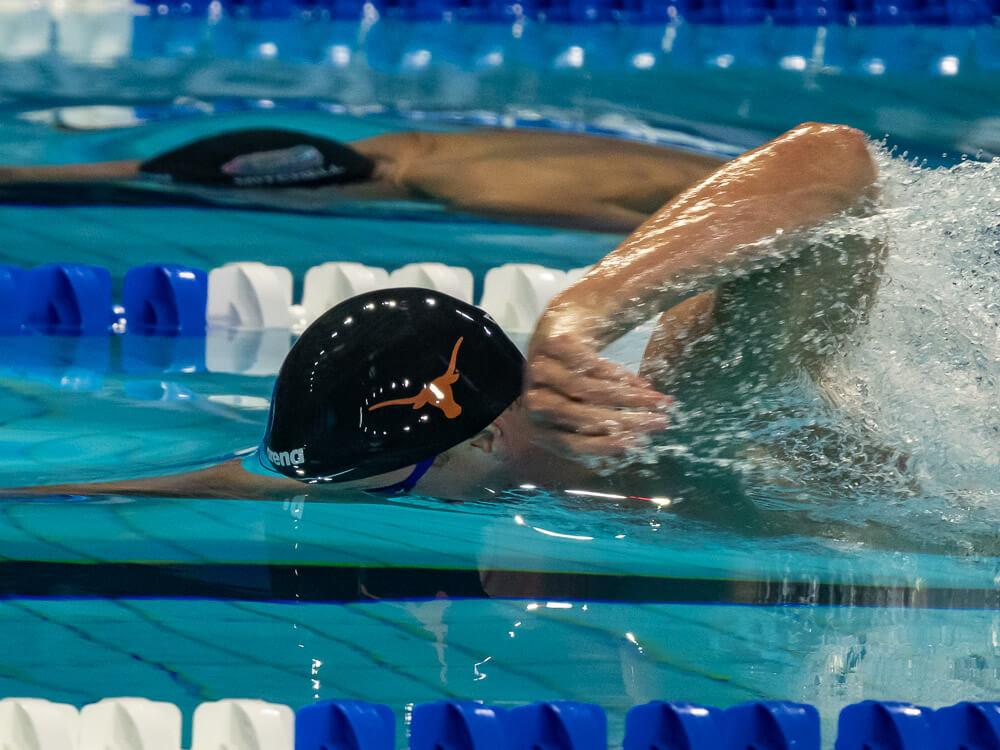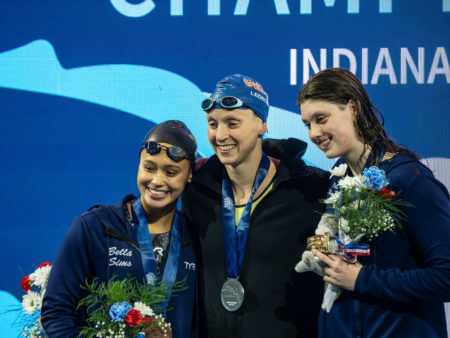American 800 Freestyle Relays Face Tough Test in Defending World Titles

American 800 Freestyle Relays Face Tough Test in Defending World Titles
The U.S. women and men each returned to the top of the podium in the 800 freestyle relay at last summer’s World Championships. The women rode the best split of Katie Ledecky’s career and a monster anchor leg of Bella Sims to take down the favored Australians while the men rebounded from a crushing fourth-place finish at the Tokyo Olympics, taking advantage of a depleted field to win by three seconds.
This year in Fukuoka, however, both American groups will face a rival with a major star returning. On the women’s side, the Aussies bring back 200 free Olympic champion Ariarne Titmus in addition to an improved Mollie O’Callaghan (pending her ongoing injury concerns) while the Great Britain men will once again have the same foursome that won Olympic gold in 2021, with Duncan Scott returning to the world stage and Matt Richards having the best season of his life.
In order for the Americans to defend both world titles, it was incumbent upon the 200 freestylers racing at U.S. Nationals to record enough strong performances to set themselves up well for Fukuoka. Indeed, both groups are looking stronger this year than they were following the 2022 selection meet, but will they be strong enough?
Let’s take a look at the potential squads that could be assembled.
For the women, Claire Weinstein was the surprise winner of the 200 free, running down Ledecky at the finish. Weinstein’s time was 1:55.26, almost one-and-a-half seconds faster than the 1:56.71 she swam to lead off last year’s relay. Ledecky was second while Bella Sims and Erin Gemmell finished third and fourth, respectively, with Alex Shackell and Leah Smith likely joining the Worlds squad as alternates.
The standard for success in 2023 was much higher than in 2022. Smith finished sixth in 1:56.91, which is faster than Weinstein’s runner-up time from last year’s selection meet. Gemmell’s fourth-place time of 1:56.23 surpassed last year’s fourth-place time by 1.3 seconds. So the top potential American relay, counting Ledecky’s season-best time of 1:54.96, looks like this:
United States: Katie Ledecky 1:54.96 + Claire Weinstein 1:55.26 + Bella Sims 1:56.08 + Erin Gemmell 1:56.23 = 7:42.53

Bella Sims, Katie Ledecky & Claire Weinstein — Photo Courtesy: Peter H. Bick
Already, this is the fastest composite relay the American women have ever assembled, and we know based on a decade of history that Ledecky always brings her best performances for this squad, including a 1:53.67 split last year. Sims, meanwhile, split 1:54.60 anchoring the relay to gold in Budapest, so she, too, brings a strong presence to this relay.
But the times still lean Australia, with O’Callaghan and Titmus leading the way. The best quartet based on season-best times includes Shayna Jack, who went 1:55.37 in April. Jack was ninth in the event at Australia’s Trials, swimming more than a second slower, but she is part of Australia’s Fukuoka squad for the 400 free relay, so she could still be added to this team. We will give two composite relays, one including Jack’s time and one based solely on swimmers who specifically qualified for this event.
Australia: Mollie O’Callaghan 1:53.83 + Ariarne Titmus 1:54.14 + Shayna Jack 1:55.37 + Lani Pallister 1:56.03 = 7:39.37
Australia (qualifiers only): Mollie O’Callaghan 1:53.83 + Ariarne Titmus 1:54.14 + Lani Pallister 1:56.03 + Madison Wilson 1:56.68 = 7:40.68
Regardless of the methodology used, Australia still owns a significant advantage on paper, and the best possible time is less than a tenth shy of the world record Australia set at last year’s Commonwealth Games (7:39.29). This analysis does not include the potential of Kiah Melverton, who split 1:55.40 as part of the Aussies’ world-record-setting squad, but we also don’t know the status of O’Callaghan heading to Worlds.
But remember, this is familiar territory for the U.S. women. Last year, the deficit was far greater following Trials, and the coaches were still able to assemble a gold-medal squad. There’s enough talent and a history of relay success among the Americans to make this race essentially an Australian-leading toss-up one month out from Worlds.
The men will face off against Great Britain with both groups having at least four men under 1:46 in advance of the World Championships. The British squad is led by Richards and Olympic gold medalist Tom Dean both under 1:45 with James Guy and Scott set to join them.
The top American swimmer so far is Luke Hobson, whose sensational back half lifted him to a World Championships spot Wednesday evening, and the swimmers likely to join him are returnees from last year’s Worlds team, Kieran Smith, Carson Foster and Drew Kibler. Foster scratched the individual 200 free final, but he is already on the U.S. team for Fukuoka as a result of his win in the 200 butterfly. Jake Mitchell qualified for Worlds after swimming under 1:46 for the first time in prelims, and Baylor Nelson and Henry McFadden are the expected alternates.
A comparison of season-best times show only a half-second difference between the groups. We are also including Australia, the winner of silver at last year’s World Championships, in this analysis, but no Aussie has broken 1:46 yet this year.
Great Britain: Matt Richards 1:44.83 + Tom Dean 1:44.93 + James Guy 1:45.85 + Duncan Scott 1:45.90 = 7:01.51
United States: Luke Hobson 1:45.12 + Kieran Smith 1:45.63 + Carson Foster 1:45.64 + Drew Kibler 1:45.67 = 7:02.06
Australia: Kai Taylor 1:46.25 + Alexander Graham 1:46.68 + Thomas Neill 1:46.82 + Elijah Winnington 1:46.85 = 7:06.42
The margins between the American and British squads right now is minimal, and there is reason to expect improvement from essentially all of the participants. Dean, Guy and Scott have all split 1:43s on this relay at different points in their career while Smith has a 1:44.74 flat-start swim on his résumé with Kibler owning a best of 1:45.01 from his fourth-place finish in last year’s Worlds final. And Hobson noted that perhaps a 1:44 performance was in the cards Wednesday had he not gone out in 52.08 over the first 100 meters.
“I walked over to (Texas head coach) Eddie (Reese) afterward, and he was like, ‘You were out too slow.’ First thing he said to me,” Hobson said. “I’m pretty confident I could have done it if I was out a little faster.”
Regardless, the race is on for Fukuoka, and the world record of 6:58.55 that has lasted since 2009 will come under serious threat from both teams. We’ll see who can deliver with gold on the line, but Kibler gave one very specific reason why he feels good about the Americans’ hopes, a methodology tinted with some burnt orange Texas Longhorn flair.
“Carson and I have never lost an 800 free relay if we’re on it together, whether it’s NCAA or internationally,” Kibler said. “That’s all I’m going to say. We’ve never lost.”




